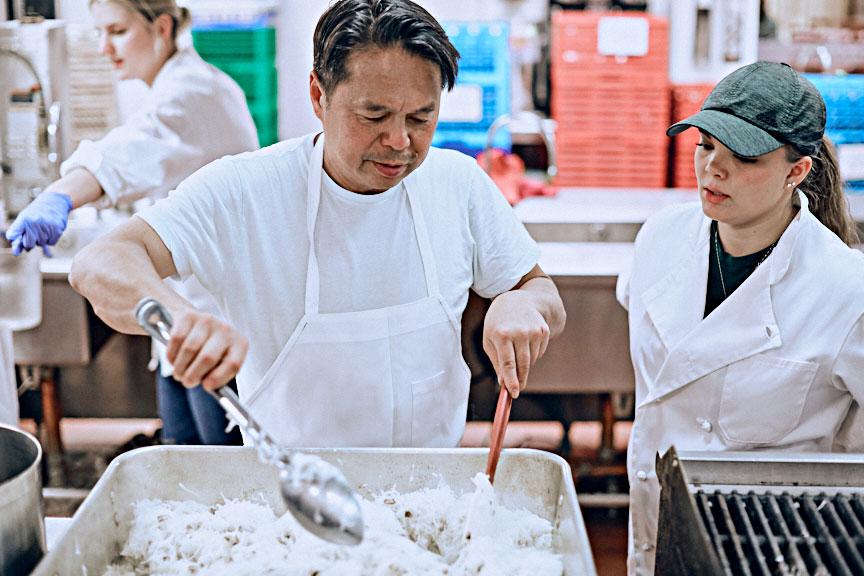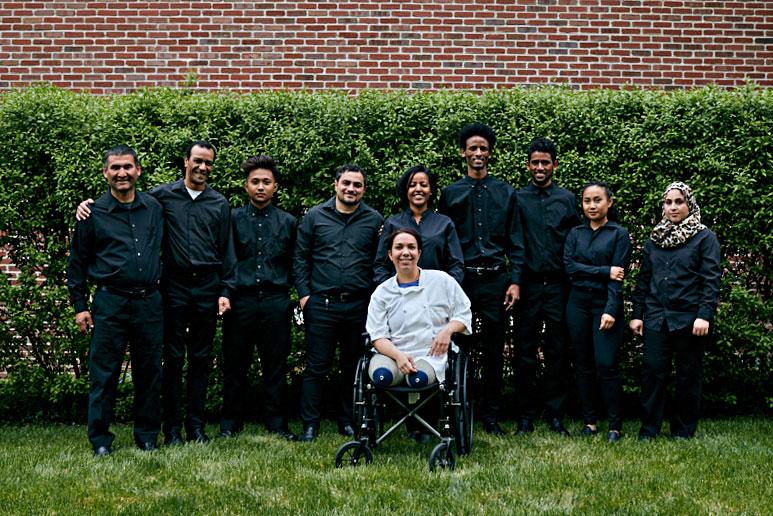
Charles Phan is usually hard at work at one of his restaurants in the San Francisco Bay area. But in mid-May, the famous chef was overseeing a dinner at the University of Denver. Phan, best known for his restaurant The Slanted Door in San Francisco’s Mission District, flew the thousand-plus miles to help immigrants like himself get jobs.
The class, including newly arrived refugees from Iraq, Afghanistan, Burma and other countries, had just finished a month-long job training program at DU called Ready for American Hospitality that embeds immigrants with university students and prepares both groups to work in the hospitality industry.
Phan, whose family fled to Guam from Vietnam on a boat in 1975 before settling in San Francisco, came to share not just what he knows about food, but also what he’s learned as an immigrant in America.
“In the past, I don't talk about being a refugee just because I don't want to have a chip on my shoulder,” Phan said. “But with today's climate and how we as a country treat other refugees, I feel like I need to speak up because I was afforded that opportunity 44 years ago.”
For newcomers like Zarevitz Camacho of Venezuela, the stint at DU is a stepping stone to other jobs, perhaps in other fields. She’s now a cashier at DIA, and volunteers for a nonprofit that works with immigrants detained at the Aurora immigration detention facility.

Of the 11 immigrants who graduated from this most recent class, seven are working full-time in hospitality or food services. Of those not working in hospitality, one student is working construction, another is returning to school, one is traveling to see family, and the other is awaiting documentation.
Camacho was among the students busy at work hours before the evening’s festivities in the hospitality school’s huge industrial kitchen. She was paired with DU junior Julien Constantino on dish duty.
Phan had another motive for his visit. At a time when unemployment is low, he said, restaurants like his need more staff. For example, Phan said opened a restaurant four months ago in San Francisco’s East Bay and it’s packed every night.
“But we haven't been able to open for lunch because we don't have enough staffing,” he said. “I never heard of something you couldn't open something because you don't have enough people to work. It’s usually because no one will come.”
The refugees’ managers at the evening’s dinner — which included touches of flavor from Phan’s native Vietnam, steamed chicken with lily bud and crème brulee paired with a variety of high-end wines — were all upperclassmen in DU’s Fritz Knoebel School of Hospitality Management. The idea for pairing immigrants and college students was the brainchild of Cheri Young, who teaches a class at DU called "Managing Human Capital." Young said you can’t learn to manage people from a textbook.
“Ideally I would give each of my students their own company with employees but I can't do that,” she said.
Instead, Young says, the immigrants, who apply for this free, month-long program, play the role of employees and the DU students, the employers.
“My students write job descriptions, hire for positions, train, and write performance appraisals,” she explained.
Then, Young says, the on-job-training begins. Her students train the immigrant students how do things like run the dish machine, prep the food, serve wine with the label facing to the guest and how to pour a perfect 4-ounce glass of wine.
Camacho says she learned a lot from Constantino during the month-long program, including a key to success in hospitality.
“Always make [people] smile,” she said. “That's very important.”
But the learning goes both ways. The upperclassmen get leadership experience and, perhaps more importantly, they get a broader perspective on the world. Many of the refugees and immigrants come with a wealth of experience -- often more than their DU mentors. Constantino says he quickly learned that when he interviewed Camacho.
“At the very end, she says ‘Wow you guys did a really good job,' and we were like ‘Wait, what?’ And she said, ‘Yeah, I was an interviewer back in my country.’”
Instructor Cheri Young, who started the program in 2012, said her DU students also do home visits with the refugees they work with.
“They're learning about other cultures, how to interact with other people, how to be respectful, how to recognize talents and strengths in so many different forms, not just the American form.”
The next Ready for American Hospitality training will be offered in September.








